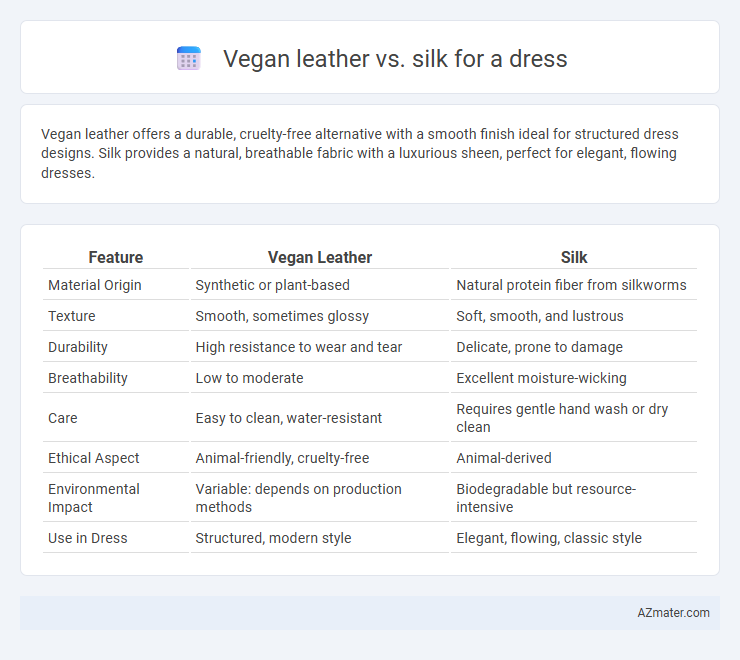Vegan leather offers a durable, cruelty-free alternative with a smooth finish ideal for structured dress designs. Silk provides a natural, breathable fabric with a luxurious sheen, perfect for elegant, flowing dresses.
Table of Comparison
| Feature | Vegan Leather | Silk |
|---|---|---|
| Material Origin | Synthetic or plant-based | Natural protein fiber from silkworms |
| Texture | Smooth, sometimes glossy | Soft, smooth, and lustrous |
| Durability | High resistance to wear and tear | Delicate, prone to damage |
| Breathability | Low to moderate | Excellent moisture-wicking |
| Care | Easy to clean, water-resistant | Requires gentle hand wash or dry clean |
| Ethical Aspect | Animal-friendly, cruelty-free | Animal-derived |
| Environmental Impact | Variable: depends on production methods | Biodegradable but resource-intensive |
| Use in Dress | Structured, modern style | Elegant, flowing, classic style |
Introduction to Vegan Leather and Silk
Vegan leather, crafted from synthetic materials or plant-based sources like pineapple leaves and apple peels, offers a cruelty-free and eco-conscious alternative to traditional leather, prized for its durability and versatile texture. Silk, a natural protein fiber produced by silkworms, is renowned for its luxurious softness, breathability, and sheen, often preferred in high-end dressmaking for its elegant drape and comfort. Both materials cater to distinct fashion needs, with vegan leather emphasizing sustainability and animal welfare, while silk highlights natural beauty and tactile luxury.
Material Origins and Production Processes
Vegan leather, made primarily from synthetic materials or plant-based sources like pineapple leaves and cork, offers an animal-free alternative with a focus on sustainability and reduced environmental impact compared to traditional leather. Silk, derived from the protein fibers produced by silkworms, undergoes a labor-intensive process involving sericulture, which includes cultivating silkworms and harvesting cocoons, often raising concerns about animal welfare. The production of vegan leather emphasizes innovative, cruelty-free techniques, while silk's natural origin and intricate processing highlight its luxurious texture but involve ethical and environmental considerations.
Sustainability and Environmental Impact
Vegan leather, often made from polyurethane or plant-based materials like pineapple leaves or apple peels, offers a cruelty-free alternative to traditional leather with lower water consumption but may involve synthetic chemicals impacting biodegradability. Silk, a natural protein fiber produced by silkworms, is biodegradable and renewable but raises concerns due to resource-intensive cultivation, including high water usage and mulberry farming. Evaluating sustainability, vegan leather's environmental footprint depends on production methods, while silk's impact centers on agricultural inputs and ethical considerations regarding insect welfare.
Comfort and Wearability in Dresses
Vegan leather offers a sleek, modern look with water resistance and durability but tends to lack breathability, making it less comfortable for extended wear, especially in warm climates. Silk, known for its natural softness and excellent moisture-wicking properties, provides superior comfort and breathability, ideal for lightweight and breathable dresses. While vegan leather dresses excel in style longevity, silk dresses remain unmatched in comfort and wearability for everyday or formal use.
Aesthetic Appeal: Texture and Appearance
Vegan leather offers a sleek, polished surface with a matte to semi-gloss finish that provides a modern, edgy look ideal for contemporary dress designs. Silk exhibits a natural sheen and smooth, flowing texture that enhances elegance and adds a luxurious depth to garments. The choice between vegan leather and silk depends on whether the desired aesthetic emphasizes structured sophistication or soft, luminous grace.
Durability and Longevity
Vegan leather offers excellent durability and resistance to wear and tear, making it a practical choice for long-lasting dresses that withstand frequent use. Silk, while luxurious and breathable, tends to be more delicate and prone to damage from abrasion and sunlight, reducing its longevity in everyday wear. Investing in vegan leather dresses ensures extended lifespan and easier maintenance compared to the high-care requirements of silk garments.
Cost Comparison: Price and Value
Vegan leather typically costs between $20 to $60 per yard, offering a budget-friendly alternative to silk, which prices range from $30 to over $100 per yard due to its natural origin and luxurious texture. While vegan leather provides durability and affordability, silk offers superior breathability and a premium, soft feel that justifies its higher cost for special occasions. The value of vegan leather lies in ethical appeal and cost savings, whereas silk is prized for its elegance and comfort, often influencing the dress price and perceived luxury.
Ethical Considerations: Animal Welfare
Vegan leather offers a cruelty-free alternative to silk, eliminating the need to harm animals such as silkworms, which are often boiled alive in conventional silk production. This ethical choice supports animal welfare by avoiding exploitation and promoting sustainable cruelty-free materials. Consumers prioritizing animal rights increasingly prefer vegan leather due to its non-animal origin and lower impact on sentient beings.
Maintenance and Care Requirements
Vegan leather requires regular cleaning with a damp cloth and should be kept away from direct sunlight to prevent cracking, while avoiding harsh chemicals maintains its durability. Silk demands gentle hand washing or dry cleaning and must be air-dried away from sunlight to preserve its delicate fibers and sheen. Both materials benefit from storage in a cool, dry place, but silk's high maintenance and sensitivity contrast with vegan leather's easier, low-maintenance care routine.
Choosing the Best Material for Your Dress
Vegan leather offers a durable, cruelty-free alternative with a sleek, modern finish ideal for structured dress designs, while silk provides a luxurious, breathable fabric known for its natural sheen and softness, perfect for elegant and flowing silhouettes. Consider climate and occasion when choosing, as vegan leather resists wrinkles and moisture better, making it suitable for more versatile wear, whereas silk's delicate texture excels in formal settings but requires careful maintenance. Prioritize your comfort, style preferences, and sustainability values to select the best material that enhances both the appearance and functionality of your dress.

Infographic: Vegan leather vs Silk for Dress
 azmater.com
azmater.com